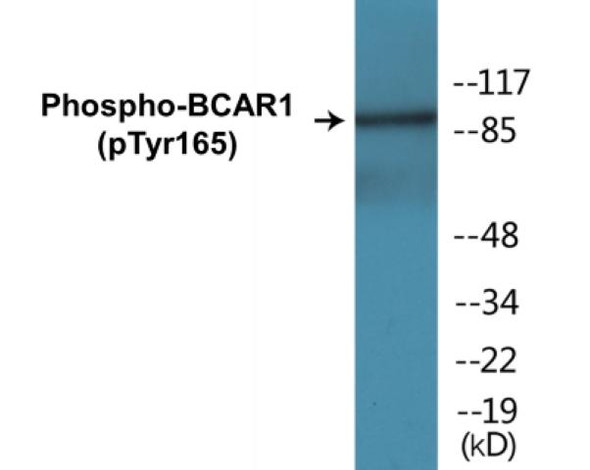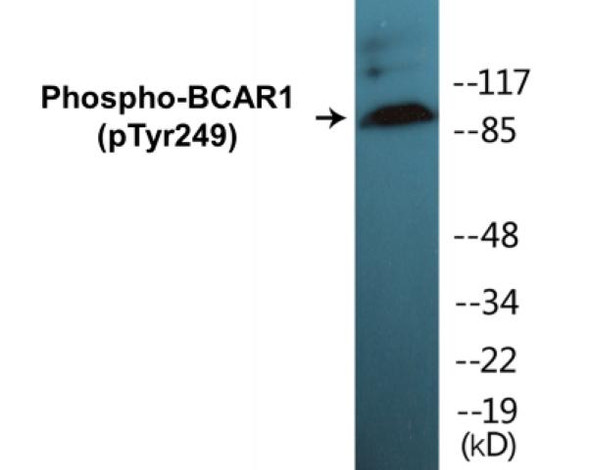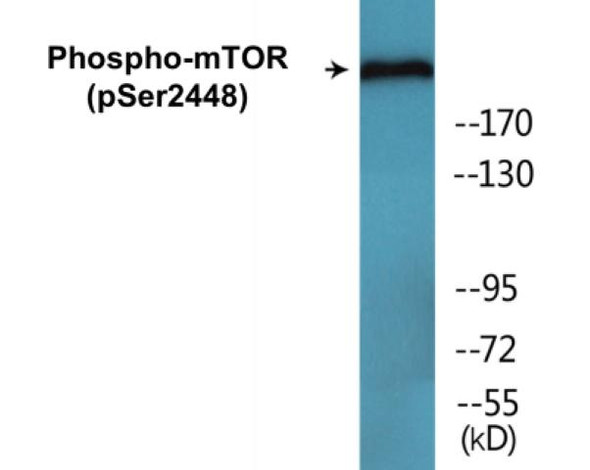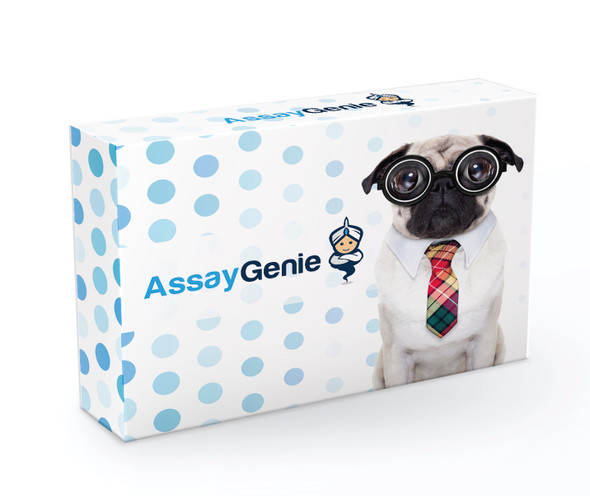Description
BCAR1 (Phospho-Tyr410) Cell-Based ELISA Kit
The BCAR1 (Phospho-Tyr410) Cell-Based ELISA Kit is a convenient, lysate- free, high throughput and sensitive assay kit that can monitor BCAR1 phosphorylation and expression profile in cells. The kit can be used for measuring the relative amounts of phosphorylated BCAR1 in cultured cells as well as screening for the effects that various treatments, inhibitors (ie. siRNA or chemicals), or activators have on BCAR1 phosphorylation.
How does our BCAR1 (Phospho-Tyr410) Fluorometric Cell-Based ELISA Kit work?
Qualitative determination of BCAR1 (Phospho-Tyr410) concentration is achieved by an indirect ELISA format. In essence, BCAR1 (Phospho-Tyr410) is captured by BCAR1 (Phospho-Tyr410)-specific primary (1°) antibodies while Dye 1-conjugated and Dye 2-conjugated secondary (2°) antibodies bind the Fc region of the 1° antibody. Through this binding, the dye conjugated to the 2° antibody can emit light at a certain wavelength given proper excitation, hence allowing for a fluorometric detection method. Due to the qualitative nature of the Cell-Based ELISA, multiple normalization methods are needed:
| 1. | A monoclonal antibody specific for human GAPDH is included to serve as an internal positive control in normalizing the target RFU values. |
| 2. | An antibody against the nonphosphorylated counterpart of BCAR1 (Phospho-Tyr410) is also provided for normalization purposes. The RFU values obtained for non-phosphorylated BCAR1 can be used to normalize the RFU value for phosphorylated BCAR1. |
BCAR1 (Phospho-Tyr410) Fluorometric Cell-Based ELISA Kit -Information
| Product Name: | BCAR1 (Phospho-Tyr410) Fluorometric Cell-Based ELISA Kit |
| Product Code/SKU: | FBCAB00013 |
| Description: | The BCAR1 (Phospho-Tyr410) Fluorometric Cell-Based Phospho ELISA Kit is a convenient, lysate-free, high throughput and sensitive assay kit that can monitor BCAR1 (Phospho-Tyr410) protein phosphorylation and expression profile in cells. The kit can be used for measuring the relative amounts of phosphorylated BCAR1 (Phospho-Tyr410) in cultured cells as well as screening for the effects that various treatments, inhibitors (ie. siRNA or chemicals, or activators have on BCAR1 phosphorylation. |
| Dynamic Range: | > 5000 Cells |
| Detection Method: | Fluorometric |
| Storage/Stability: | 4°C/6 Months |
| Reactivity: | Human, Mouse, Rat |
| Assay Type: | Cell-Based ELISA |
| Database Links: | Gene ID: 9564, UniProt ID: P56945, OMIM #: 602941, Unigene #: Hs.479747 |
| Format: | Two 96-Well Plates |
| NCBI Gene Symbol: | BCAR1 |
| Sub Type: | Phospho |
| Target Name: | Phospho-BCAR1 (Tyr410) |
Kit Principle
Figure: Schematic representation of Assay Genie Cell-Based Fluorometric ELISA principle
Kit components | Quantity |
| 96-Well Black Cell CultureClear-Bottom Microplate | 2 plates |
| 10X TBS | 24 ml |
| Quenching Buffer | 24 ml |
| Blocking Buffer | 50 ml |
| 15X Wash Buffer | 50 ml |
| Primary Antibody Diluent | 12 ml |
| 100x Anti-Phospho Target Antibody | 60 µl |
| 100x Anti-Target Antibody | 60 µl |
| Anti-GAPDH Antibody | 110 µl |
| Dye-1 Conjugated Anti-Rabbit IgG Antibody | 6 ml |
| Dye-2 Conjugated Anti-Mouse IgG Antibody | 6 ml |
| Adhesive Plate Seals | 2 seals |
Additional equipment and materials required
The following materials and/or equipment are NOT provided in this kit but are necessary to successfully conduct the experiment:
- Fluorescent plate reader with two channels at Ex/Em: 651/667 and 495/521
- Micropipettes capable of measuring volumes from 1 µl to 1 ml
- Deionized or sterile water (ddH2O)
- 37% formaldehyde (Sigma Cat# F-8775) or formaldehyde from other sources
- Squirt bottle, manifold dispenser, multichannel pipette reservoir or automated microplate washer
- Graph paper or computer software capable of generating or displaying logarithmic functions
- Absorbent papers or vacuum aspirator
- Test tubes or microfuge tubes capable of storing ≥1 ml
- Poly-L-Lysine (Sigma Cat# P4832 for suspension cells)
- Orbital shaker (optional)
Kit Protocol
This is a summarized version of the kit protocol. Please view the technical manual of this kit for information on sample preparation, reagent preparation and plate lay out.
| 1. | Seed 200 µl of desired cell concentration in culture medium into each well of the 96-well plates. For suspension cells and loosely attached cells, coat the plates with 100 µl of 10 µg/ml Poly-L-Lysine (not included) to each well of a 96-well plate for 30 minutes at 37°C prior to adding cells. |
| 2. | Incubate the cells for overnight at 37°C, 5% CO2. |
| 3. | Treat the cells as desired. |
| 4. | Remove the cell culture medium and rinse with 200 µl of 1x TBS, twice. |
| 5. | Fix the cells by incubating with 100 µl of Fixing Solution for 20 minutes at room temperature. The 4% formaldehyde is used for adherent cells and 8% formaldehyde is used for suspension cells and loosely attached cells. |
| 6. | Remove the Fixing Solution and wash the plate 3 times with 200 µl 1x Wash Buffer for 3 minutes. The plate can be stored at 4°C for a week. |
| 7. | Add 100 µl of Quenching Buffer and incubate for 20 minutes at room temperature. |
| 8. | Wash the plate 3 times with 1x Wash Buffer for 3 minutes each time. |
| 9. | Dispense 200 µl of Blocking Buffer and incubate for 1 hour at room temperature. |
| 10. | Wash 3 times with 200 µl of 1x Wash Buffer for 3 minutes each time. |
| 11. | Add 50 µl of Primary Antibody Mixture P to corresponding wells for BCAR1 (Phospho-Tyr410) detection. Add 50 µl of Primary Antibody Mixture NP to the corresponding wells for total BCAR1 detection. Cover the plate with parafilm and incubate for 16 hours (overnight) at 4°C. If the target expression is known to be high, incubate for 2 hours at room temperature. |
| 12. | Wash 3 times with 200 µl of 1x Wash Buffer for 3 minutes each time. |
| 13. | Add 50 ul of Secondary Antibody Mixture to corresponding wells and incubate for 1.5 hours at room temperature in the dark. |
| 14. | Wash 3 times with 200 µl of 1x Wash Buffer for 3 minutes each time. |
| 15. | Read the plate(s) at Ex/Em: 651/667 (Dye 1) and 495/521 (Dye 2). Shield plates from direct light exposure. |
| 16. | Wash 3 times with 200 µl of 1x Wash Buffer for 5 minutes each time. |
BCAR1 (Phospho-Tyr410) - Protein Information
| UniProt Protein Function: | P130Cas: a docking protein containing multiple protein-protein interaction domains. Plays a central coordinating role for tyrosine-kinase-based signaling related to cell adhesion. Implicated in induction of cell migration. The amino-terminal SH3 domain regulates its interaction with focal adhesion kinase (FAK) and the FAK-related kinase PYK2 and also with tyrosine phosphatases PTP-1B and PTP-PEST. Overexpression confers antiestrogen resistance on breast cancer cells. |
| UniProt Protein Details: | Protein type:Motility/polarity/chemotaxis; Adaptor/scaffold Chromosomal Location of Human Ortholog: 16q23.1 Cellular Component: ruffle; focal adhesion; lamellipodium; cytoplasm; nucleolus; plasma membrane; cytosol; actin cytoskeleton Molecular Function:signal transducer activity; protein binding; SH3 domain binding; protein kinase binding Biological Process: epidermal growth factor receptor signaling pathway; integrin-mediated signaling pathway; antigen receptor-mediated signaling pathway; platelet activation; cell migration; nerve growth factor receptor signaling pathway; actin filament organization; hepatocyte growth factor receptor signaling pathway; platelet-derived growth factor receptor signaling pathway; T cell receptor signaling pathway; regulation of apoptosis; G-protein coupled receptor protein signaling pathway; cell proliferation; B cell receptor signaling pathway; cell division; insulin receptor signaling pathway; regulation of cell growth; cell adhesion; vascular endothelial growth factor receptor signaling pathway; blood coagulation; positive regulation of cell migration |
| NCBI Summary: | BCAR1, or CAS, is an Src (MIM 190090) family kinase substrate involved in various cellular events, including migration, survival, transformation, and invasion (Sawada et al., 2006 [PubMed 17129785]).[supplied by OMIM, May 2009] |
| UniProt Code: | P56945 |
| NCBI GenInfo Identifier: | 288558806 |
| NCBI Gene ID: | 9564 |
| NCBI Accession: | P56945.2 |
| UniProt Secondary Accession: | P56945,B3KWD7, B4DEV4, B4DGB5, B4DIW5, B7Z7X7, E9PCL5 E9PCV2, F5GXA2, F5GXV6, F5H7Z0, F8WA69, |
| UniProt Related Accession: | P56945 |
| Molecular Weight: | 870 |
| NCBI Full Name: | Breast cancer anti-estrogen resistance protein 1 |
| NCBI Synonym Full Names: | breast cancer anti-estrogen resistance 1 |
| NCBI Official Symbol: | BCAR1 |
| NCBI Official Synonym Symbols: | CAS; CAS1; CASS1; CRKAS; P130Cas |
| NCBI Protein Information: | breast cancer anti-estrogen resistance protein 1; Crk-associated substrate p130Cas; Cas scaffolding protein family member 1 |
| UniProt Protein Name: | Breast cancer anti-estrogen resistance protein 1 |
| UniProt Synonym Protein Names: | CRK-associated substrate; Cas scaffolding protein family member 1; p130cas |
| Protein Family: | Breast cancer anti-estrogen resistance protein |
| UniProt Gene Name: | BCAR1 |
| UniProt Entry Name: | BCAR1_HUMAN |







